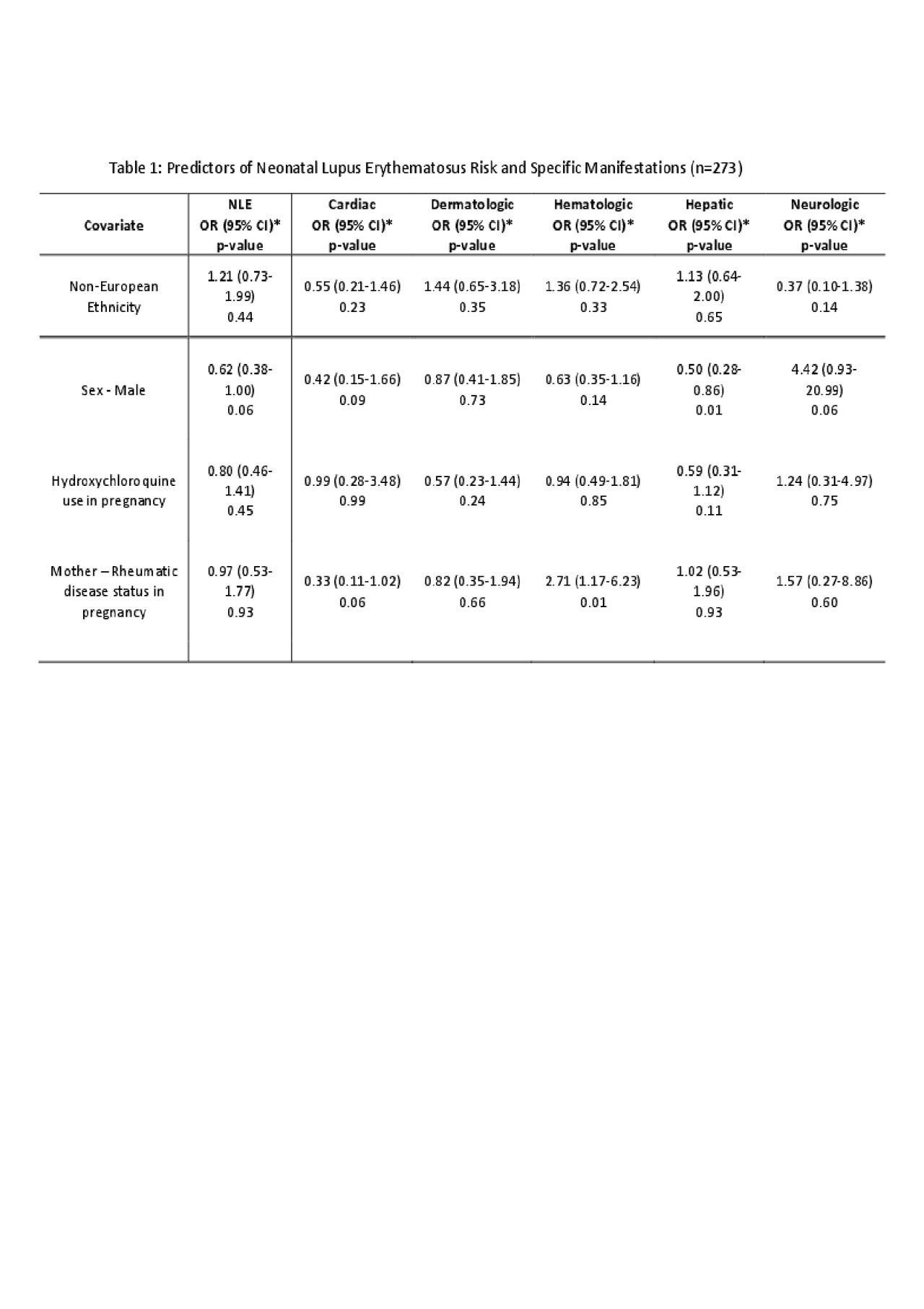Session Information
Date: Monday, November 11, 2019
Title: Pediatric Rheumatology – ePoster II: SLE, Juvenile Dermatomyositis, & Scleroderma
Session Type: Poster Session (Monday)
Session Time: 9:00AM-11:00AM
Background/Purpose: Neonatal Lupus Erythematosus (NLE) is an acquired autoimmune disorder of newborns secondary to the transplacental passage of maternal anti-Ro/La antibodies. Prior studies have suggested that children of non-European ancestry have a higher risk of cardiac disease compared to European ancestry children; however, this finding has not been consistently replicated. The risk of non-cardiac NLE manifestations by ethnicity is unknown. We aimed to evaluate the association between ethnicity and NLE risk and NLE manifestations in a large multi-ethnic population.
Methods: We conducted a cohort study of the children seen at the NLE clinic at SickKids. Children born to anti-Ro/La antibody positive mothers in the Greater Toronto Area were referred to the NLE clinic. All data was prospectively entered into a dedicated database. Beginning in 2011, families routinely reported ethnicity (Canada census categories). The cohort consisted of children ≤ 1 year of age seen between January 2011 and April 2019. The NLE patient cohort was divided into European and non-European groups according to the child’s ethnicity. Outcomes were NLE and specific NLE manifestations (cardiac, dermatologic, cytopenias, transaminitis and macrocephaly). The frequency of NLE and specific manifestations were compared among ethnic groups with Fisher’s exact test. Using separate logistic regression models, we tested the association between ethnicity and 1) NLE risk and 2) specific NLE manifestations, including covariates for child sex, maternal rheumatic disease status in pregnancy (present or absent) and maternal use of hydroxychloroquine during pregnancy, Bonferroni-corrected p-value < 0.002. Results: Our study included 326 children born to anti-Ro/La antibody positive mothers. Median follow-up period was 12 months (IQR: 2,24months). We censored 51 children with mixed ethnicity (European and Non-European). The non-European group (59%) was comprised of East Asian (30%), South Asian (25%), African (20%), Latin American (6%) and Mixed non-European ancestry (18%). In comparing European and non-European children, there was no difference in the proportion of NLE in children of European (50%) vs. non-European (54%) ancestry (p 0.46). There was no significant association between Non-European ethnicity and NLE risk and frequency of specific NLE manifestations, in univariate of multi-variable adjusted models (Table 1).
Conclusion: In our large multi-ethnic cohort, there was no statistically significant association between the child’s ethnicity and NLE risk, nor specific NLE manifestations. Future analysis will incorporate additional maternal medications during pregnancy and genetic analysis of NLE risk and specific NLE manifestations.
NLE: Neonatal Lupus Erythematosus; OR: Odd Ratio; 95% CI: 95% confidence interval.
To cite this abstract in AMA style:
Diaz T, Dominguez D, Jaeggi E, Knight A, Laskin C, Ng L, Silverio F, Silverman E, Hiraki L. Ethnicity and Neonatal Lupus Erythematosus Manifestations Risk in a Large Multi-Ethnic Cohort [abstract]. Arthritis Rheumatol. 2019; 71 (suppl 10). https://acrabstracts.org/abstract/ethnicity-and-neonatal-lupus-erythematosus-manifestations-risk-in-a-large-multi-ethnic-cohort/. Accessed .« Back to 2019 ACR/ARP Annual Meeting
ACR Meeting Abstracts - https://acrabstracts.org/abstract/ethnicity-and-neonatal-lupus-erythematosus-manifestations-risk-in-a-large-multi-ethnic-cohort/

